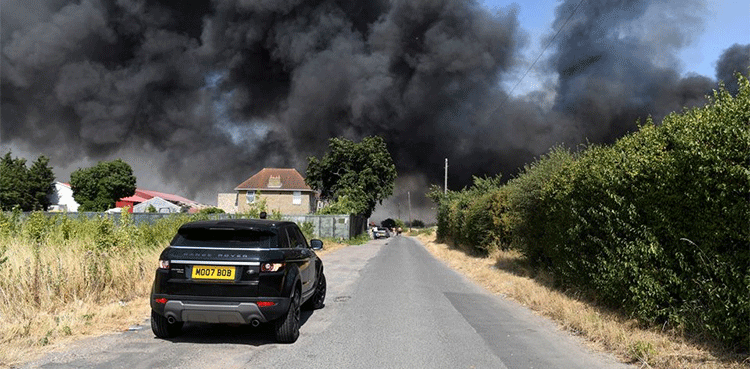
Firefighters worked overnight to damp down wildfires and engineers raced on Wednesday to fix train tracks that had buckled on Britain’s hottest day, triggering warnings that efforts to tackle climate change needed to be stepped up.
The London Fire Brigade endured its busiest day since World War Two on Tuesday when temperatures topped 40C for the first time, igniting fires that destroyed dozens of properties in the capital and sent flames racing through tinderbox-dry grassland at the sides of railway tracks and roads.
“We’ve got nothing, everything’s gone,” Timothy Stock, a resident who lost his home to fire in the village of Wennington, east of London, told the BBC.
Trains running from London up the east coast of England were cancelled at least until midday on Wednesday after a fire near the city of Peterborough in central England damaged signalling equipment. Other fires on the network damaged tracks and overhead lines.
“Please do not travel to or from London Kings Cross today,” the London North Eastern Railway operator said, of the major London station.
Britain’s Met Office said a new provisional record temperature of 40.3C (104.5F) was recorded in Coningsby, central England, on Tuesday, with 34 sites across the country beating the previous high of 38.7C (101.7F) recorded in 2019.
Forecasters predicted a much cooler day on Wednesday, with outbreaks of rain later.
A GLIMPSE OF THE FUTURE?
Britain’s government has defended its record on the environment, touting its decision to move to a net zero status, but ministers have admitted it will take years to upgrade its infrastructure to cope with the heat.
“The sad reality is this is what the future for London and the UK is likely to look like if we don’t take strong action now on the climate crisis,” said London mayor Sadiq Khan, a member of the opposition Labour Party.
The Met Office’s Chief of Science and Technology Stephen Belcher said that unless greenhouse gas emissions were reduced, Britain could see similar heatwaves every three years.
At one point on Monday, two airport runways were forced to close due to damage to the surface. Power companies faced outages as the heat scorched their equipment, many schools closed early and zoos struggled to keep pets cool.
Executives at the world’s joint-largest air show at Farnborough ducked from one air-conditioned chalet to another while many left early on Tuesday over fears the train network would struggle to keep going.
“This is a reminder today, I think, of the importance of tackling climate change because this is a remarkable unprecedented event,” Treasury Minister Simon Clarke said.
Khan praised the work of the fire brigade after it received 2,600 calls for help, compared with a normal daily average of 350. The London Ambulance Service received 400 calls an hour from people struggling with heat exposure, breathing difficulties, dizziness and fainting.
“The problem is we’ve not had rain in the entire month of July in London,” Khan told BBC Radio. “The grass is like hay, which means it’s easier to catch fire and once it catches fire it spreads incredibly fast.”
from International News Today - Breaking News, US News, World News https://ift.tt/RNyzurS
via IFTTT